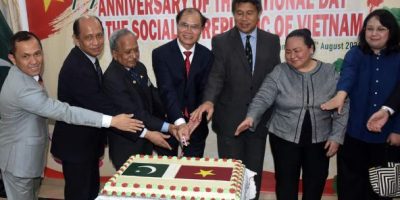IPRI rountable on rights violations on Jul 12

ISLAMABAD (DNA) -One-day Roundtable on “Violations of Rights of Religious Minorities (Muslims & Sikhs) in India” To be held on 12 July, 2017 at the IPRI Conference Hall The post-independence phase poses the challenge of multi-cultural coexistence for the Indian minorities who are facing psychological upheavals as well as social discrimination owing to Hindu fundamentalism, which is not a new phenomenon. Hindu fundamentalism has been changing and taking different shapes within the Indian sociopolitical structure. Now it has turned into an organized communal movement against the Indian minorities. Rather, the violation of human rights in India is the outcome of the rising tide of communal violence. Ever since independence, successive Indian regimes have been projecting India as an enlightened secular state upholding equal rights for all religious minorities. However, the fact remains that so called “shining and rising India” is a closed society where the intensity of deep-rooted Hindu fanaticism is a common factor. Hindu fundamentalism, overlooked by the Hindu dominated Indian governments, has posed a grave menace to India as a country; the Muslims, the Christians, and the Sikhs have all fallen prey to Hindutva. In this regard, engineering communal riots have been an integral part of Hindu extremist philosophy and its operational strategy being pursued by Rashtriya Swayamsevak Sangh (RSS). Through violent means, it has pursued manifold objectives, such as stopping missionary activity, snatching land and property from Muslims and cleansing Muslims, Christians and Sikhs out of specific areas. Anti-minority’s violence in India evokes memories of anti-Muslim riots of 1947, continuous genocide of Kashmiris since 1947, Bombay riots of 1993, Muslim massacre of Gujarat in 2002, Sikh genocide especially the Golden Temple massacre of 1984 and the plight of Indian Christians, and Harijans, etc. Despite the constant mantra of Indian governments about equity and justice among all segments of society, unfortunately, the state has failed to offer equal rights to its religious minorities. Ironically, it was claimed by the architects of the Indian Constitution that they have guaranteed human rights in the Indian Constitution. They have included rights contained in the Universal Declaration of Human Rights (UDHR) such as civil, political, economic, social and cultural. The civil and political rights have been incorporated in Part III of the Indian Constitution, i.e. Fundamental Rights. The economic, social and cultural rights have been incorporated in Part IV of the Indian Constitution, i.e. Directive Principles of States Policy. Besides, India has also signed and ratified a number of the UN conventions, which provide laws for the protection of minorities’ rights such as the Convention Against Torture and Other Cruel (1984), and Inhuman or Degrading Treatment or Punishment (1984), etc., but in actual fact, the minorities experience insecurity, marginalization and exclusion in the Indian social, legal and political structure. This bitter reality demonstrates the clear violation of the Indian constitution. Rather, the Hindu dominated governments have been playing with the religious sentiments of the Indian minorities such as demolition of Babri Mosque in 1992, atrocities on Muslims of Indian occupied Kashmir since 1947 and especially after 1989, calling Mother Teresa as “agent of West,” considering Sikhs and Hindus being part of the same faith and the Golden Temple sacrilege by the Indian Army in 1984 are 2 some of the hallmarks of Indian brutalities. Consequently, when Indian minorities protest to seek their rights, the Indian governments use brutal state force to terrorize them. In this context, the Muslims and the Sikhs are the worst affected minorities. In fact, attacks against the minorities in India need to be viewed against the backdrop of the rise of Hindu Fundamentalism including Hindutva sympathetic policies of the Indian governments. The Muslims in India form the largest community but are still far behind in terms of human development. This can be seen in Justice Rajinder Sachar Committee Report of 2007 on the condition of minorities. The report highlighted the deplorable socioeconomic plight of the Muslim community. Since 1946, Indian Muslims have suffered heavy losses of life and property in total of 45,000 communal riots, of which more than 23,000 riots were major ones in which more than 7,60,000 Muslims were ruthlessly massacred A number of reports submitted by the Indian governments’ officially appointed inquiry commissions have clearly identified RSS, Bharatiya Janata Party (BJP), Vishva Hindu Parishad (VHP), Shiv Sena and other Hindu extremist organizations for instigating and fanning the anti-Muslim riots. No Indian government has ever initiated action against such extremist elements, which proves the fact that there is a pattern wherein, the Central and the Provincial governments overlook the atrocities against the Muslims and take no action against the culprits. The Samjhauta Express bombing of 2007 is also an example of the extremist group Abhinav Bharat and its affiliate. The human rights abuses by the Indian security forces in the Indian-administered Jammu and Kashmir State are well-known. The Indian governments have unleashed state terrorism on unarmed defenceless Kashmiris since 1989 to crush their movement, launched to get their right of self-determination as was promised to them in the United Nations Security Council Resolutions. Due to state terrorism, over 1 million Kashmiris have suffered in terms of massacres, extra-judicial killings, staged encounters and organized dishonouring of women coupled with arbitrary arrest of tens of thousands with their fate unknown. The Indian security forces have been given virtual immunity to commit human rights violations in Kashmir in the form of Armed Forces Special Power Act (AFSPA) and Public Safety Act (PSA). Likewise, other minorities have also suffered from the Indian state terrorism. The Sikhs of India at the time of partition of the subcontinent were promised a separate state by Nehru, which was lately, not only denied, but also Sikhs were labelled as a “criminal tribe” and they were deprived of their religious and political identity by the Hindu-led Congress government. Resultantly, the Sikh Home Rule movement began as a nonviolent political movement in 1960 and lasted till 1978. The movement turned violent from 1978 till 1993 due to Indian state atrocities on Sikhs. Since 1993 due to denial of Sikh Home Rule by the successive Indian governments, the Sikhs started demanding a separate homeland for themselves in the form of Khalistan movement. Having failed to permanently extinct initially the Sikh Home Rule movement and then Khalistan movement, a number of operations were conducted, which caused large scale genocide of the Sikh nation. Across the nation, more than 8,000 Sikhs were killed since 1964, according to some eyewitness accounts, women were raped, burnt alive, 3 homes brought down, children denied education and forced to live in an environment of terror unleashed by various operations launched by Indian Security Forces such as Paonta Sahib Massacre 1964, Vaisakhi Massacre 1978 and Operation Blue Star 1984. The year 1984 stands out as the most fateful year in the history of Sikhs when countless Sikhs were ruthlessly killed, which was considered a systematic genocide of the Sikhs. In the backdrop of the above discussion, IPRI is organizing a Roundtable on July 12, 2017, on “Violations of Rights of Religious Minorities in India” to highlight India’s state terrorism on the Muslims and Sikhs. Sub-Themes 1. Indian Secularism and Policy towards Religious Minorities: Myth and Reality 2. Plight of Muslim Community and Indian Atrocities on the Kashmiris 3. Indian HR Violations and Atrocities on the Sikhs, forcing them to demand a Separate Homeland
Related News

Magnolia Chapter of FASP hosts AGM with stunning floral art demonstration
ISLAMABAD, AUG 31 /DNA/ – Serena Hotel, Islamabad. The meeting started with the recitation ofRead More

Vietnam celebrates 79th national day
ISLAMABAD, AUG 31 /DNA/ – Ambassador of Socialist Republic of Vietnam Pham Anh Tuan theRead More


Comments are Closed